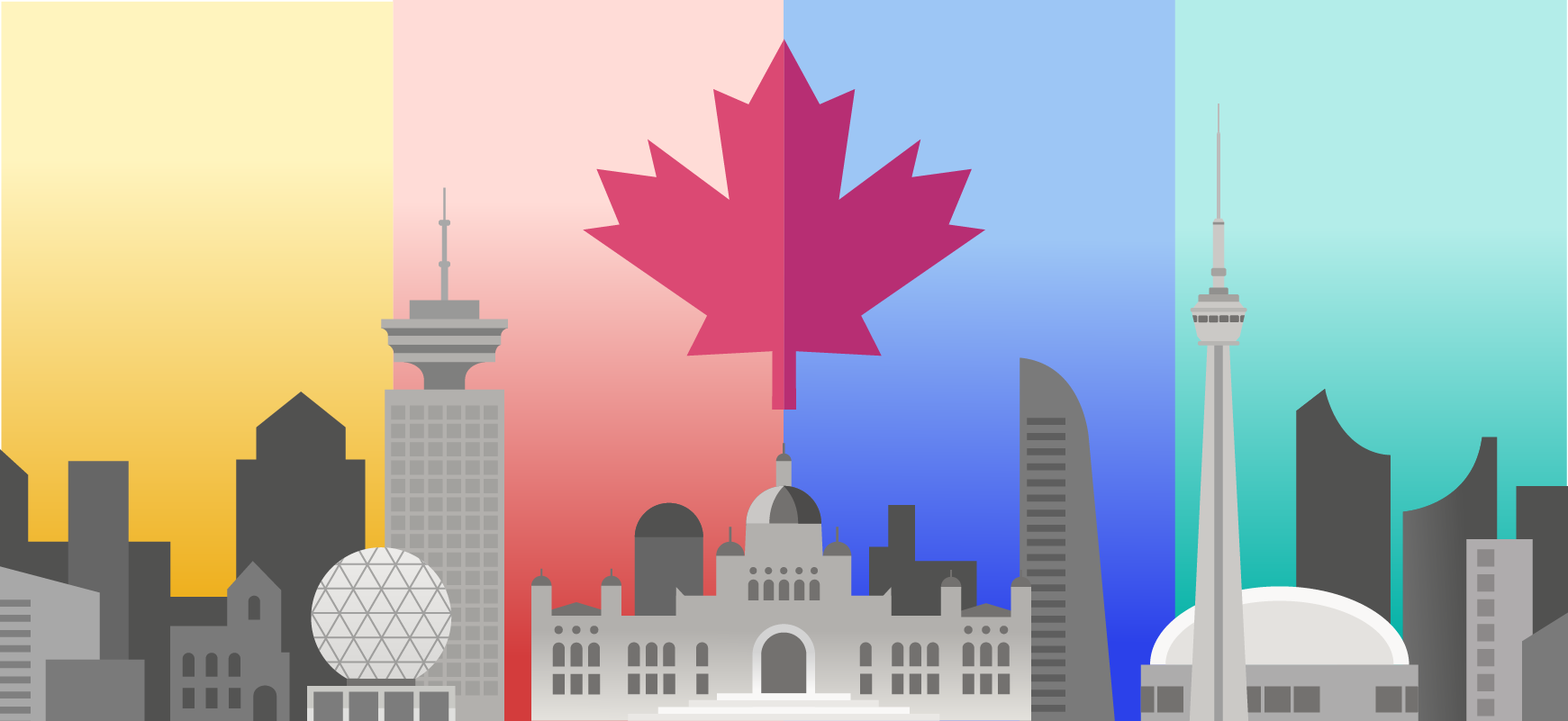With the Ontario government recently announcing a three-step plan to gradually lift COVID-19 health measures, many people may be eager to participate in social activities this summer. Lifestyle and spending habits may change as the province opens up, and with more opportunities to spend money, debt may be top-of-mind for many Ontario residents and consumers may be curious about where their debt stands relative to others.
To get a snapshot of consumer debt levels across the province, Borrowell, a fintech company that offers free credit report monitoring, analyzed over 485,000 credit reports of its Ontario members, including those in 25 of the largest cities in Ontario. The study reviewed revolving debt and installment debt (excluding mortgages) from Q1 2020 to Q1 2021 to help consumers measure their financial health when it comes to non-mortgage debt, comparing their own debt levels to city and provincial averages found in the study.
Note: Credit reports were pulled from Equifax Canada.
Key FindingsAverage consumer debt in Ontario (excluding mortgages) in Q1 2021 was $27,523, remaining flat compared to last year with a slight 3% decrease
Average revolving balance (credit cards and lines of credit) in Q1 2021 was $10,770
Average installment balance (auto loans and personal loans) in Q1 2021 was $16,753
Oakville, Richmond Hill, and Markham have the highest average amount of consumer debt at $48,410, $37,827, and $36,809, respectively
Hamilton, Niagara Falls, and Windsor have the lowest average amount of consumer debt, at $19,932, $21,341 and $21,397, respectively
Average Ontario Consumer Owes $27,523, Excluding MortgagesThe findings reveal that the average consumer debt (excluding mortgages) balance of Ontario consumers has remained relatively flat, decreasing slightly by 3% in the past year, down to $27,523. This is surprisingly positive news, considering the scope of COVID lockdown measures and the loss of 355,300 jobs in Ontario in 2020.
Consumer debt is defined as the total balance on installment credit and revolving credit accounts listed on credit reports. For the purpose of this study, consumer debt does not include mortgages.
Installment credit includes personal loans, auto loans, and student loans - loans that involve borrowing a fixed amount of money from a lender. Consumers make regular payments over a specific amount of time to pay off the balance on their account.
Revolving credit includes credit cards and lines of credit (such as personal lines of credit or home equity lines of credit). Each account has a maximum credit limit and the balance that isn’t paid off can be carried over from month to month.
Out of the 25 major Ontario cities in the study, only 3 experienced average consumer debt increases in Q1 2021 from Q1 2020: Oakville (+2%), Brantford (+1%), and Kingston (+4%); 10 of the 25 cities in this study Ontario have average consumer debt higher than the provincial average of $27,523.
The average revolving balance was $10,770 and average installment balance was $16,753. Across Ontario cities, both average revolving balances and installment balances trended down in Q1 2021 compared to last year.
GTA Cities Carry Highest Amounts of Consumer DebtOut of the 25 Ontario cities featured in this study, the top 10 cities with the highest amounts of consumer debt are in the Greater Toronto Area (GTA). Combined, these cities have a weighted average consumer debt of $33,592, 22% higher than the provincial average of $27,523.
The 3 cities in Ontario with the highest average amount of consumer debt are Oakville ($48,410), Richmond Hill ($37,827), and Markham ($36,809). The 3 cities in Ontario with the lowest average amount of consumer debt are Hamilton ($19,932), Niagara Falls ($21,341), and Windsor ($21,397).
Toronto on the Lower End of Consumer Debt Compared to Rest of OntarioToronto has the 15th highest amount of average consumer debt out of the 25 cities featured in this study. Average consumer debt in Toronto decreased by 5% over the past year to $24,825, which is $2,698 below the provincial average. Revolving debt decreased by 10% to $11,018 over the past year, while installment debt fell by just 1% to $13,807 over the same period.
Revolving Debt Down 7% YoY in Ontario, Less Leisure SpendingThe rest of Ontario tells a similar story to Toronto when it comes to revolving debt versus installment debt. Revolving debt in Ontario was down -7% to $10,770 over the past year, while installment debt fell by just 1% to $16,753 over the same period.
Increased public health measures and restrictions over the past year have limited what Ontario residents can spend their money on. With many workplaces enforcing work-from-home policies, gas and transit purchases have likely decreased since March 2020. In addition, limitations on dining out, in-person shopping, and similar activities have limited discretionary spending. These trends have played a role in decreased revolving debt over the past year.
Looking Ahead, Consumer Debt May RiseWith the province on the verge of re-opening, discretionary spending and consumer debt are expected to rise. “We’ve seen positive consumer debt trends over the past year, but the next few months could mark a significant shift,” said Andrew Graham, co-founder and CEO of Borrowell. “Loan deferral programs have already begun wrapping up, and people are eager to get out and socialize once again. The financial habits that consumers developed over the past year will almost certainly change as more opportunities become available to socialize and spend this summer. We could see an increase in consumer debt over the next few months.”
“With this data study, we want to give Ontario consumers a snapshot of where they stand with their debt. There are resources available for people to compare other aspects of their financial health, such as salaries and home prices. But many people may be in the dark about how much consumer debt is normal to have and how their debt levels compare to others. Our goal with this study is to help Ontario consumers see where they stand in their financial health when it comes to non-mortgage debt.”
Infographic: Consumer Debt by City in OntarioConsumer Debt Stats by City in OntarioCities With Highest Non-Mortgage Consumer Debt, Q1 2021 and One-Year Change
Oakville: $48,410 (+2%)
Richmond Hill: $37,827 (-8%)
Markham: $36,809 (-6%)
Milton: $36,769 (-5%)
Burlington: $36,665 (0%)
Cities With Lowest Non-Mortgage Consumer Debt, Q1 2021 and One-Year Change
Hamilton: $19,932 (-2%)
Niagara Falls: $21,341 (-3%)
Windsor: $21,397 (-3%)
Kitchener: $23,250 (-1%)
Oshawa: $23,548 (-2%)
Cities with Highest Revolving Debt, Q1 2021 and One-Year Change
Oakville: $24,490 (-4%)
Richmond Hill: $17,948 (-11%)
Burlington: $17,338 (-6%)
Markham: $16,638 (-1%)
Milton: $16,146 (-9%)
Cities with Lowest Revolving Debt, Q1 2021 and One-Year Change
Windsor: $6,729 (-4%)
Niagara Falls: $7,331 (-6%)
Hamilton: $7,519 (-6%)
Kitchener: $7,672 (-3%)
London: $7,712 (-6%)
Cities with Highest Installment Debt, Q1 2021 and One-Year Change
Oakville: $23,920 (+9%)
Milton: $20,623 (-1%)
Markham: $20,171 (-11%)
Richmond Hill: $19,879 (-5%)
Burlington: $19,327 (+6%)
Cities with Lowest Installment Debt, Q1 2021 and One-Year Change
Hamilton: $12,413 (+1%)
Toronto: $13,807 (-1%)
Niagara Falls: $14,010 (-1%)
Waterloo: $14,042 (-1%)
Windsor: $14,668 (-3%)
MethodologyReport findings are based on historical credit report data of 485,589 Borrowell members in Ontario for Q1 2021 and Q1 2020 who had a (non-zero) credit score and findings may not represent the entire population. A credit score of zero is generated if the credit bureau does not have enough information from an individual’s credit report to calculate a score; credit bureaus require six months of credit history on an individual’s credit report to calculate their credit score. Credit reports of Borrowell members are provided by Equifax.
Non-mortgage debt is defined as the total balance on installment credit and revolving credit accounts listed on credit reports.
Installment credit includes personal loans, auto loans, and student loans - loans that involve borrowing a fixed amount of money from a lender or creditor. Consumers make regular payments over a specific amount of time to pay off the balance on their account.
Revolving credit includes credit cards and lines of credit (such as personal lines of credit or home equity lines of credit) - each account has a maximum credit limit and the balance that isn’t paid off can be carried over from month to month.
Cities in this study are based on locations provided by members when they sign up for Borrowell.
Media Contact
For media inquiries and interviews, please contact [email protected]









